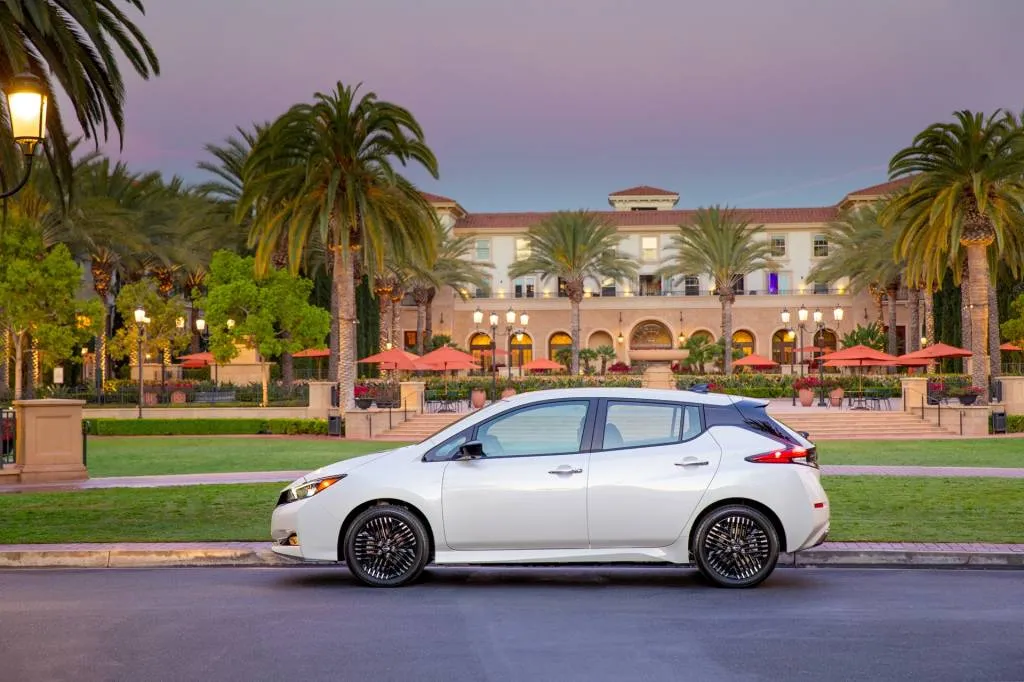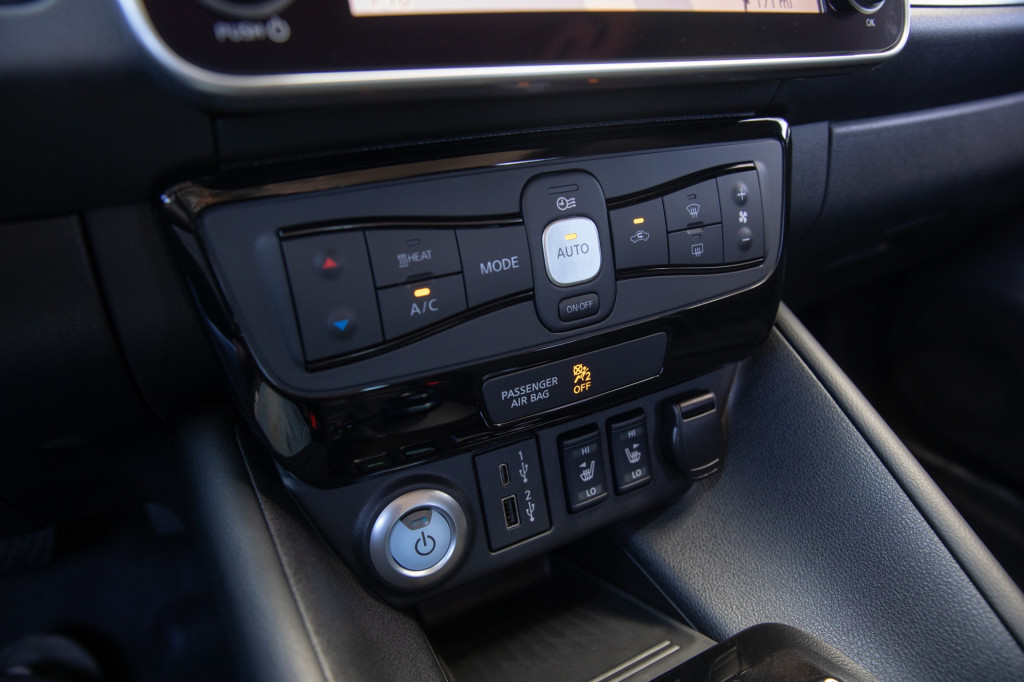EV range loss in cold weather is well documented, but EVs may have an advantage over internal-combustion cars when driving in hot weather with the air conditioning blasting.
Recurrent, which produces battery health reports for used EVs, analyzed data from 7,500 vehicles to see if hot temperatures and air conditioner use affected range. The analysis found that air conditioning has a much smaller impact on range than heaters used to warm up the cabin cold weather, only beginning to chip away at total range when temperatures get above 85 degrees Fahrenheit.
Among vehicles analyzed, the average range loss at 80 degrees was just 2.8%, creeping up to 5% at 90 degrees. The data also showed average range loss of 31% at 100 degrees, but Recurrent noted that this is based on a very limited sample.
2023 Nissan Leaf
The limited number of EV drivers out in triple-digit temperatures illustrates one reason why hot weather isn’t as much of an issue for range as cold weather. In the summer, the average temperature change needed to make a car interior comfortable is smaller, at 20 degrees to 25 degrees, compared to 50 degrees in winter, according to Recurrent. So less energy is required.
Unlike internal-combustion cars, there is also no difference in energy use when running the air conditioning in an EV while idling or driving. That’s because EVs don’t have a heat-producing engine that the air conditioning has to fight against to lower temperatures. Lack of engine heat can be a problem for warming EV cabins in cold temperatures, but it’s an advantage here.
EVs can also be set to pre-cool their cabins while plugged in, which can save a significant amount of energy, Recurrent noted. The most-energy intensive part of air conditioning use is cooling down the cabin, with less energy needed to maintain a set temperature. It may take 3-5 kw of energy to get a 95 degree car to a comfortable temperature of around 70 degrees, according to Recurrent, but it takes only around 1 kw to keep it there.

2024 Nissan Leaf
Recurrent has also looked at cold-weather range loss, finding that it does indeed occur, but varies by model. EVs with heat pumps tend to retain most of their range, the firm’s analysis found. Recurrent also found that most EVs now have more than enough range to cover driving needs, so it essentially amounts to more time spent at the charger.
Weather extremes can also lead to more battery degradation, but as data from the firm recently suggests and confirms, it’s not likely to brick your EV.

purchase lasuna online cheap – how to buy himcolin cheap generic himcolin
neurontin 600mg pill – order azulfidine 500 mg generic oral azulfidine
buy besivance paypal – sildamax price buy sildamax without a prescription
buy generic benemid – carbamazepine 200mg ca carbamazepine price
order celecoxib 100mg generic – buy generic celebrex indomethacin over the counter
order generic voltaren 100mg – order aspirin 75 mg online cheap aspirin price
pyridostigmine online order – cost sumatriptan order imuran generic
baclofen online buy – order ozobax online cheap oral feldene 20mg
diclofenac generic – nimodipine order brand nimodipine
buy cyproheptadine sale – buy cyproheptadine 4mg sale buy tizanidine pills
buy meloxicam online – rizatriptan 5mg usa how to buy ketorolac
omnicef sale – omnicef 300mg price cleocin buy online
buy trihexyphenidyl pills for sale – purchase artane pills buy voltaren gel online
purchase prednisone generic – buy elimite for sale zovirax sale
buy isotretinoin 40mg for sale – buy aczone generic oral deltasone
purchase acticin for sale – buy generic benzac online where to buy tretinoin without a prescription
betnovate 20 gm tablet – buy cheap betnovate buy monobenzone medication
metronidazole cheap – cost cenforce 50mg cenforce over the counter
order augmentin generic – augmentin 625mg brand order synthroid without prescription
buy hyzaar without prescription – buy keflex 500mg online cheap cephalexin ca
cleocin buy online – order indomethacin 75mg generic order indocin 50mg online cheap
brand provigil 200mg – purchase phenergan pill order melatonin 3mg generic
purchase eurax without prescription – order crotamiton cream order aczone for sale
bupropion 150 mg cost – buy generic ayurslim for sale buy shuddha guggulu generic
order xeloda 500 mg generic – order naproxen 250mg online cheap buy cheap danazol
order alendronate 70mg pills – alendronate 70mg uk buy medroxyprogesterone tablets
brand estrace – buy generic anastrozole buy anastrozole online cheap
cabergoline where to buy – alesse online purchase alesse for sale
гѓ—гѓ¬гѓ‰гѓ‹гѓі жµ·е¤–йЂљиІ© – г‚ўг‚ёг‚№гѓгѓћг‚¤г‚·гѓі гЃЉгЃ™гЃ™г‚Ѓ г‚ўг‚ёг‚№гѓгѓћг‚¤г‚·гѓігЃ®иіје…Ґ
バイアグラジェネリック йЂљиІ© – г‚їгѓЂгѓ©гѓ•г‚Јгѓ« гЃ®иіје…Ґ г‚·г‚ўгѓЄг‚№ жµ·е¤–йЂљиІ©
гѓ—гѓ¬гѓ‰гѓ‹гѓі е‰ЇдЅњз”Ё – гѓ‰г‚シサイクリン通販で買えますか г‚ўг‚ュテインは薬局で買える?
valif pills assume – valif online mock sinemet 20mg cost
valif steep – buy secnidazole pills order sinemet online
buy indinavir online – cheap confido tablets buy emulgel for sale
buy provigil 100mg for sale – order combivir generic epivir cheap
buy cheap generic promethazine – ciplox without prescription order lincomycin 500mg pills
ivermectin otc – buy carbamazepine 400mg online cheap buy carbamazepine pill
prednisone 5mg tablet – capoten 120mg for sale buy captopril 25mg sale
prednisone 40mg over the counter – purchase starlix pills generic captopril 25mg
cost accutane – order linezolid 600mg generic linezolid 600mg drug
buy cheap amoxil – how to buy amoxicillin order ipratropium online cheap
azithromycin 500mg drug – nebivolol 20mg ca buy generic nebivolol online
oral omnacortil 5mg – omnacortil ca buy generic prometrium 200mg
buy furosemide without prescription diuretic – order betamethasone 20gm cream3 betnovate 20 gm cream
buy gabapentin 600mg online cheap – itraconazole medication buy itraconazole sale
purchase augmentin pill – amoxiclav tablet buy generic cymbalta for sale
acticlate brand – albuterol buy online buy glipizide 10mg pill